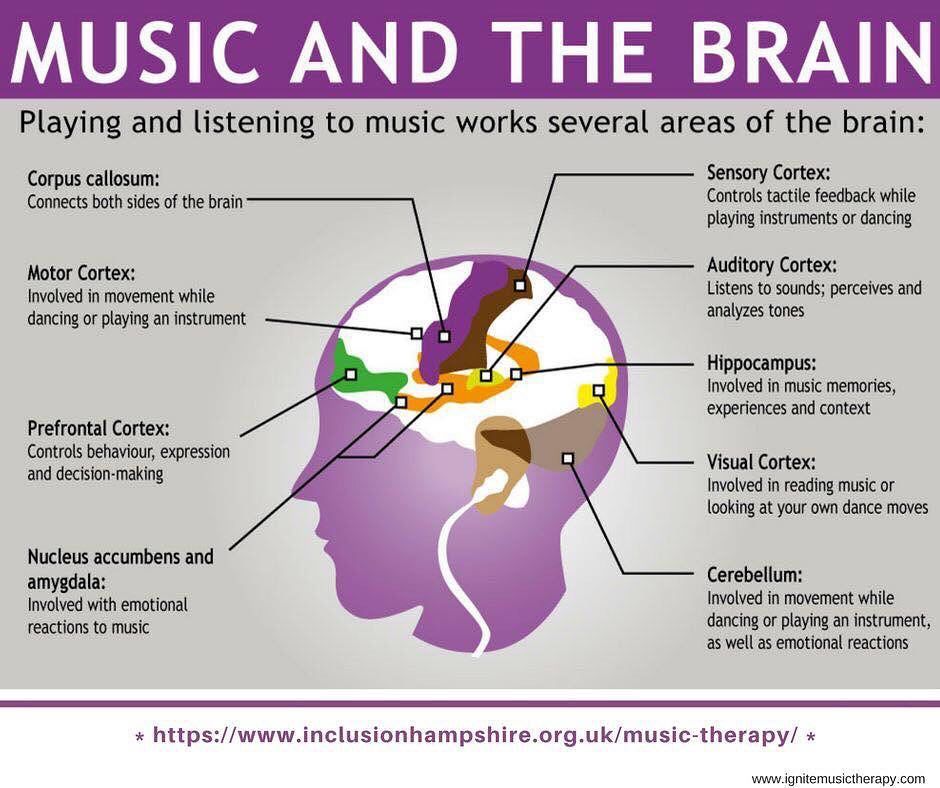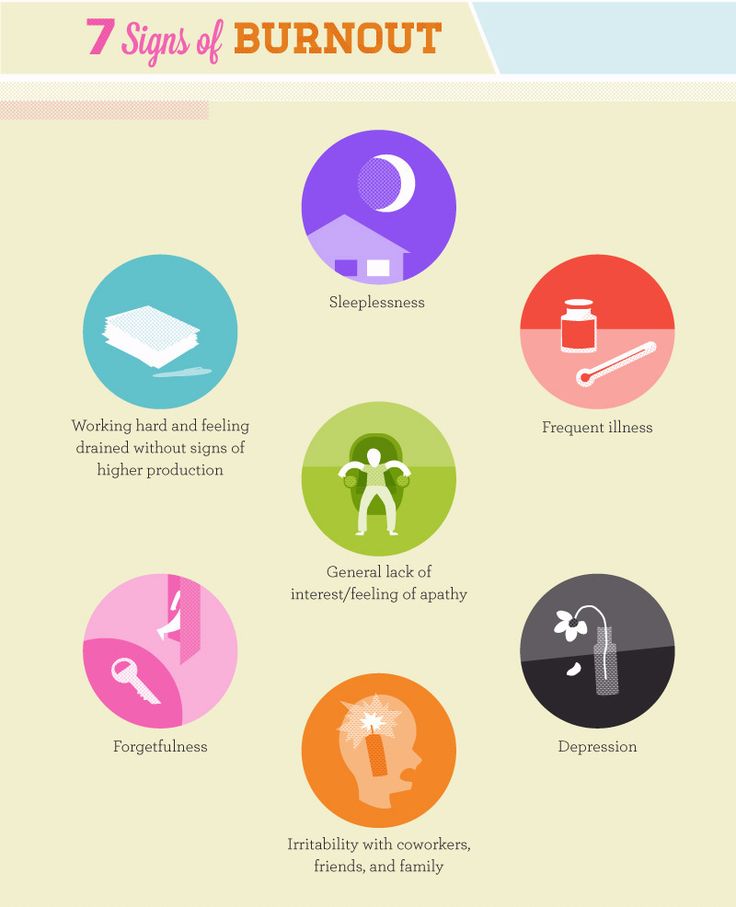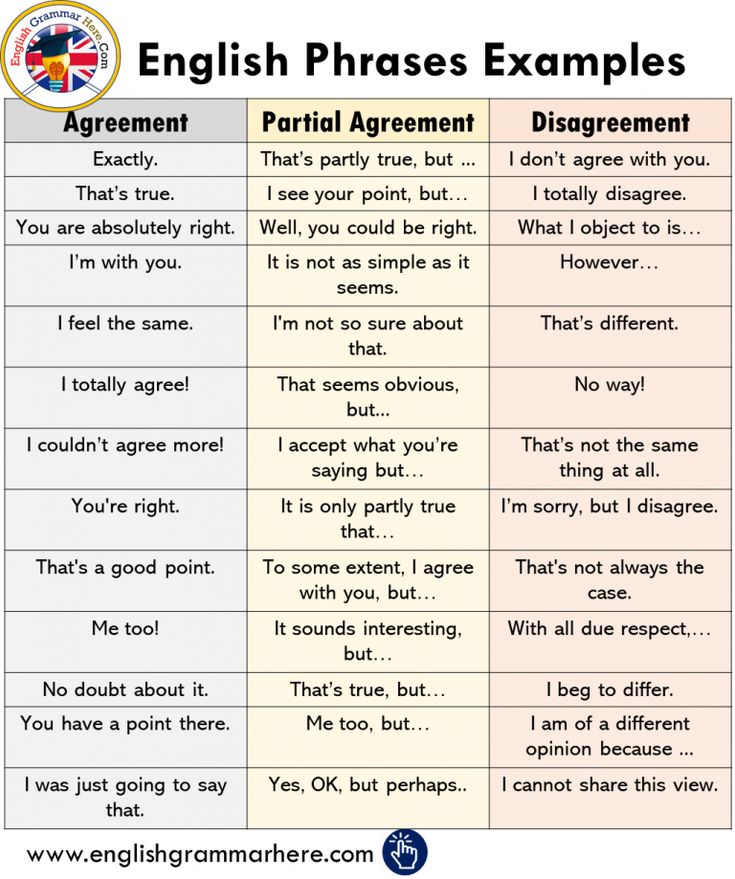Cognitive thought distortions
How to recognize and tame your cognitive distortions
Two things I have accomplished, in different realms, seem like they would require entirely different skill sets, yet I have discovered an unexpected overlap. The first is overcoming a vicious addiction to prescription painkillers, and the second is training to be a health and wellness coach. The common skills and practices of these two experiences include
- a focus on gratitude for what is going well in my life and for those around me
- mindfulness and presence in the moment
- engaging in healthy habits: exercise, good nutrition, and, ideally, sleep (not my specialty!)
- connection with others, open and honest communication, and empathy, including self-empathy.
Additionally, a critical component to attaining the serenity and focus one needs to be a wellness coach, and to move past an addiction, is learning how to recognize and defuse the cognitive distortions that we all employ. Cognitive distortions are internal mental filters or biases that increase our misery, fuel our anxiety, and make us feel bad about ourselves. Our brains are continually processing lots of information. To deal with this, our brains seek shortcuts to cut down our mental burden. Sometimes these shortcuts are helpful, yet in other circumstances — such as with these unhelpful cognitive filters — they can cause more harm than good.
Unhelpful thinking and why we do it
Ruminative thinking — negative thought patterns that loop repeatedly in our minds — is common in many psychiatric disorders. This type of thinking also contributes to the unhappiness and alienation that many people feel. One certainly doesn’t have to have a psychiatric diagnosis to ruminate unhelpfully. Most of us do this to a certain extent in response to our anxieties about certain situations and challenges. Rumination can represent an ongoing attempt to come up with insight or solutions to problems we are concerned about.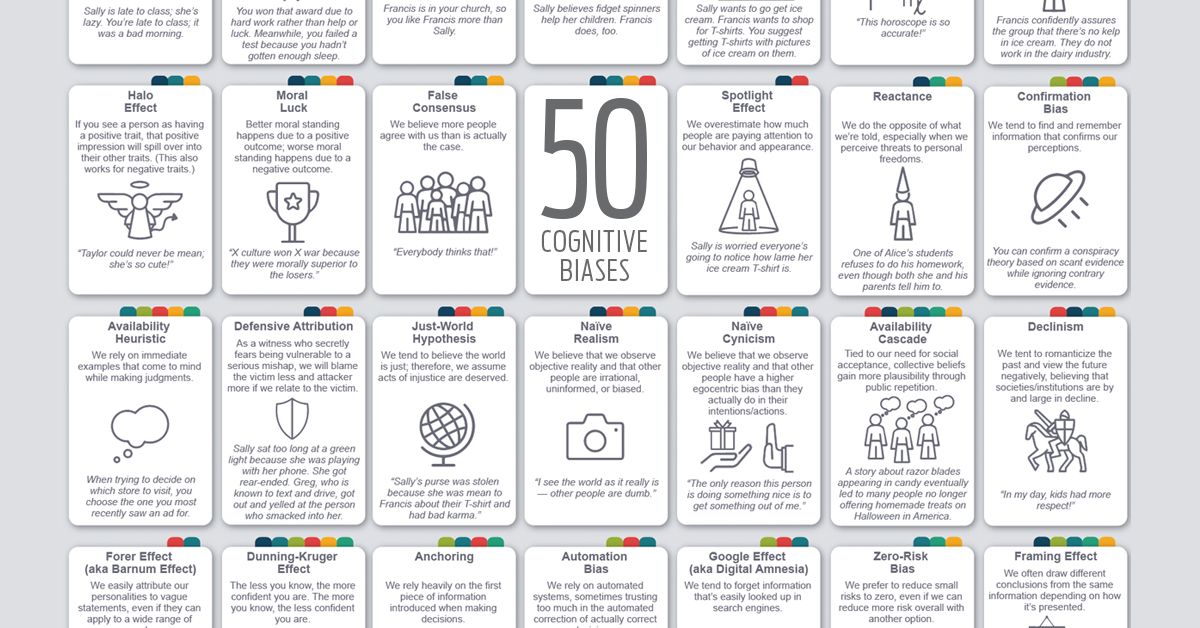 Unfortunately, with the presence of these cognitive filters, it can devolve into a counterproductive and depression-worsening type of brooding. These unhelpful filters make whatever life circumstances we find ourselves in that much more anxiety-provoking and challenging.
Unfortunately, with the presence of these cognitive filters, it can devolve into a counterproductive and depression-worsening type of brooding. These unhelpful filters make whatever life circumstances we find ourselves in that much more anxiety-provoking and challenging.
What are unhelpful cognitive distortions?
The main cognitive distortions are as follows (and some of them overlap):
- Black-and-white (or all-or-nothing) thinking: I never have anything interesting to say.
- Jumping to conclusions (or mind-reading): The doctor is going to tell me I have cancer.
- Personalization: Our team lost because of me.
- Should-ing and must-ing (using language that is self-critical that puts a lot of pressure on you): I should be losing weight.
- Mental filter (focusing on the negative, such as the one aspect of a health change which you didn’t do well): I am terrible at getting enough sleep.
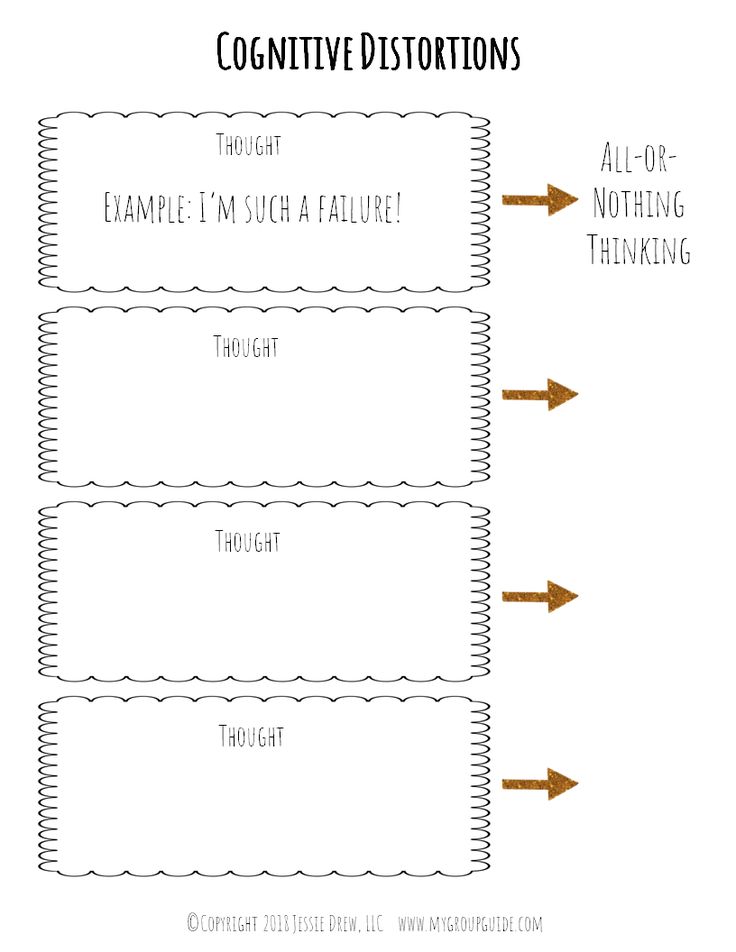
- Overgeneralization: I’ll never find a partner.
- Magnification and minimization (magnifying the negative, minimizing the positive): It was just one healthy meal.
- Fortune-telling: My cholesterol is going to be sky-high.
- Comparison (comparing just one part of your performance or situation to another’s, which you don’t really know, so that it makes you appear in a negative light): All of my coworkers are happier than me.
- Catastrophizing (combination of fortune-telling and all-or-nothing thinking; blowing things out of proportion): This spot on my skin is probably skin cancer; I’ll be dead soon.
- Labeling: I’m just not a healthy person.
- Disqualifying the positive: I answered that well, but it was a lucky guess.
Emotional reasoning and not considering the facts
Finally, many of us engage in emotional reasoning, a process in which our negative feelings about ourselves inform our thoughts, as if they were factually based, in the absence of any facts to support these unpleasant feelings.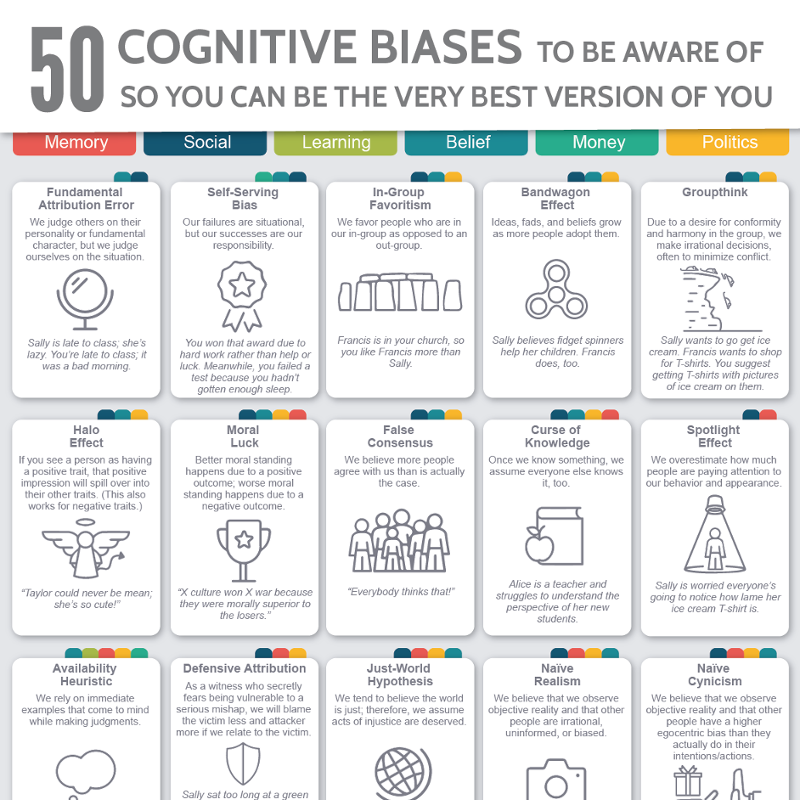 In other words, your emotions and feelings about a situation become your actual view of the situation, regardless of any information to the contrary. Emotional reasoning often employs many of the other cognitive filters to sustain it, such as catastrophizing and disqualifying the positive. Examples of this may be thinking:
In other words, your emotions and feelings about a situation become your actual view of the situation, regardless of any information to the contrary. Emotional reasoning often employs many of the other cognitive filters to sustain it, such as catastrophizing and disqualifying the positive. Examples of this may be thinking:
- I’m a whale, even if you are losing weight
- I’m an awful student, even if you are getting some good grades
- My partner is cheating on me, even if there is no evidence for this (jealousy is defining your reality)
- Nobody likes me, even if you have friends (loneliness informs your thinking).
How do you challenge and change cognitive distortions?
A big part of dismantling our cognitive distortions is simply being aware of them and paying attention to how we are framing things to ourselves. Good mental habits are as important as good physical habits.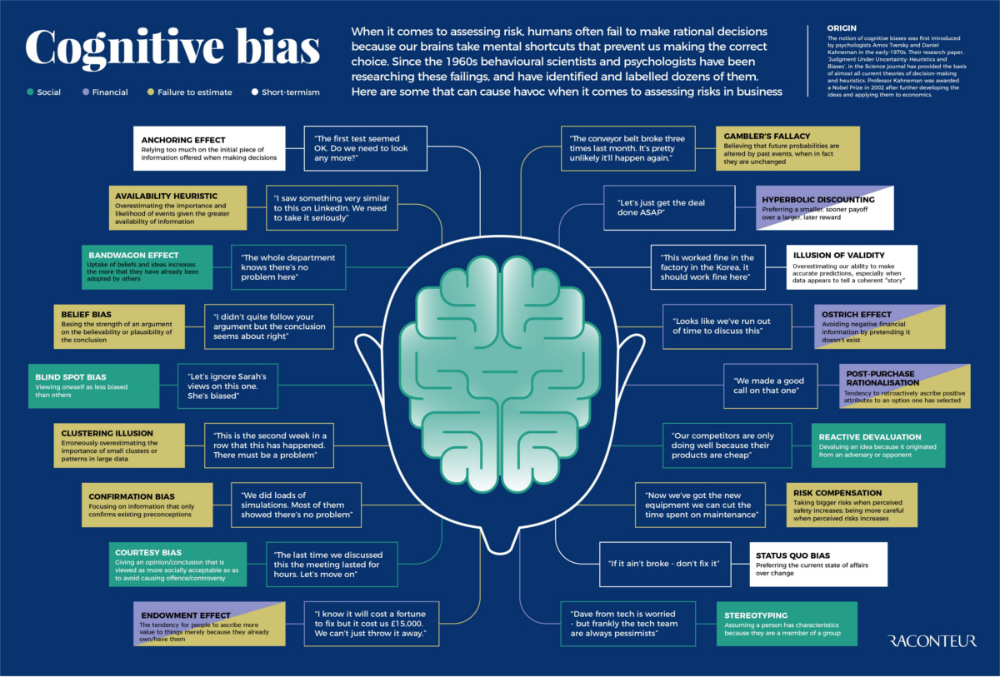 If we frame things in a healthy, positive way, we almost certainly will experience less anxiety and isolation. This doesn’t mean that we ignore problems, challenges, or feelings, just that we approach them with a can-do attitude instead of letting our thoughts and feelings amplify our anxiety.
If we frame things in a healthy, positive way, we almost certainly will experience less anxiety and isolation. This doesn’t mean that we ignore problems, challenges, or feelings, just that we approach them with a can-do attitude instead of letting our thoughts and feelings amplify our anxiety.
As someone who used to be an expert in getting tripped up by all these filters, I’ve learned to remind myself that whatever comes up, I’ll deal with it as well as I can. I try to trust my future self to cope, in an effective way, with whatever life will throw my way. As such, there’s no reason to worry about potential future problems in the here and now. If I worry about what might happen, then I have two problems: whatever hypothetical challenge that might not even come up in the future and a lot of unhelpful anxiety to contend with. As they say in the science fiction masterpiece Dune, "fear is the mind-killer." Being anxious or afraid certainly makes me less effective, no matter what I’m trying to accomplish.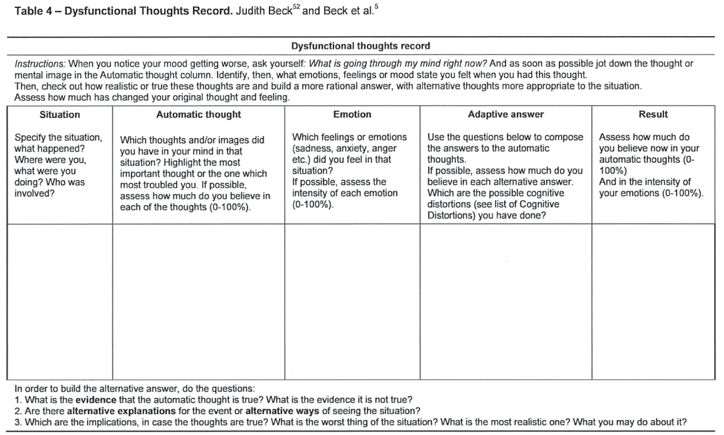
A wise therapist once told me, as an example, if someone cuts you off in traffic, they are just cutting off a random car, not you, because they have no idea who you are. So there’s no reason to take it personally. To personalize situations like this just makes you upset. If you don’t take it personally, it changes it from "jerk cut me off" to "people should drive more safely."
I also avoid unnecessary catastrophizing (though this can be difficult when thinking about all that is happening in our world, including climate change). Above all, I try not to slip into emotional reasoning. None of us are devoid of all emotions that could undermine our logical processes. Everyone backslides and falls into old habits. We aim for progress, not perfection.
If you can set yourself free from these unhelpful cognitive filters, you will be more successful, more relaxed, and more able to enjoy your relationships.
Getting support to managing cognitive distortions
If you need assistance with challenging cognitive distortions, professionals such as therapists and coaches are skilled at helping people change unhelpful ways of thinking.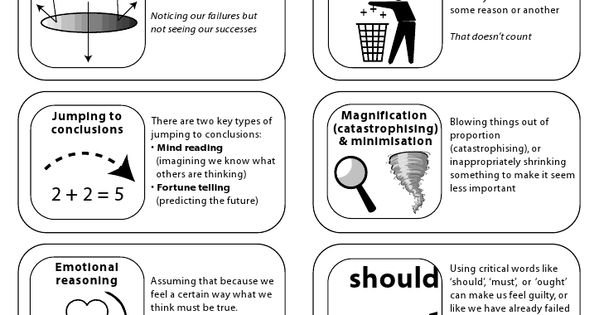 If you are unable to find or afford a therapist or a coach, there are other resources available, such as apps to help with mindfulness and cognitive behavioral therapy, mutual support groups, group therapy or group coaching (which can be less expensive than individual treatment), employee assistance programs through your job, or online communities. Your primary care doctor or your health insurance may help connect you with other resources.
If you are unable to find or afford a therapist or a coach, there are other resources available, such as apps to help with mindfulness and cognitive behavioral therapy, mutual support groups, group therapy or group coaching (which can be less expensive than individual treatment), employee assistance programs through your job, or online communities. Your primary care doctor or your health insurance may help connect you with other resources.
15 Cognitive Distortions to Blame for Your Negative Thinking
A distorted thought or cognitive distortion — and there are many — is an exaggerated pattern of thought that’s not based on facts. It consequently leads you to view things more negatively than they really are.
In other words, cognitive distortions are your mind convincing you to believe negative things about yourself and your world that are not necessarily true.
Our thoughts have a great impact on how we feel and how we behave. When you treat these negative thoughts as facts, you may see yourself and act in a way based on faulty assumptions.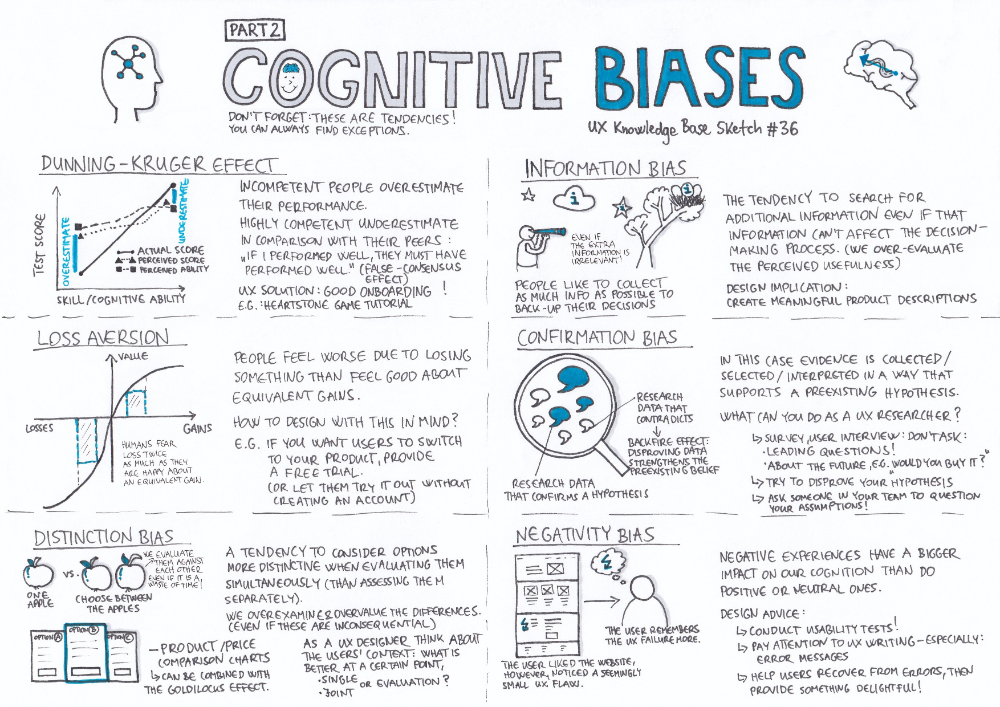
Everyone falls into cognitive distortions on occasion. It’s part of the human experience. This happens particularly when we’re feeling down.
But if you engage too frequently in negative thoughts, your mental health can take a hit.
You can learn to identify cognitive distortions so that you’ll know when your mind is playing tricks on you. Then you can reframe and redirect your thoughts so that they have less of a negative impact on your mood and behaviors.
The most common cognitive distortions or distorted thoughts include:
- filtering
- polarization
- overgeneralization
- discounting the positive
- jumping to conclusions
- catastrophizing
- personalization
- control fallacies
- fallacy of fairness
- blaming
- shoulds
- emotional reasoning
- fallacy of change
- global labeling
- always being right
You may identify with some more than others or recognize you tend to use one in particular for specific situations.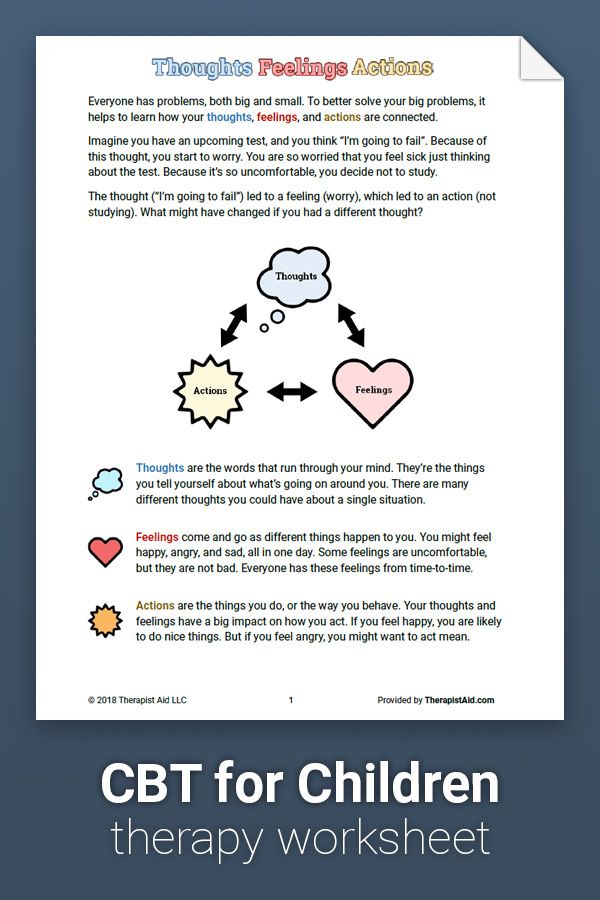 This is natural.
This is natural.
Self-examination might be the first step toward reversing negative thinking and some of these thought patterns.
Here’s a closer look at the list of cognitive distortions:
Filtering
Mental filtering is draining and straining all positives in a situation and, instead, dwelling on its negatives.
Even if there are more positive aspects than negative in a situation or person, you focus on the negatives exclusively.
Example
It’s performance review time at your company, and your manager compliments your hard work several times. In the end, they make one improvement suggestion. You leave the meeting feeling miserable and dwell on that one suggestion all day long.
Polarization or all-or-nothing thinking
Polarized thinking is thinking about yourself and the world in an “all-or-nothing” way.
When you engage in thoughts of black or white, with no shades of gray, this type of cognitive distortion is leading you.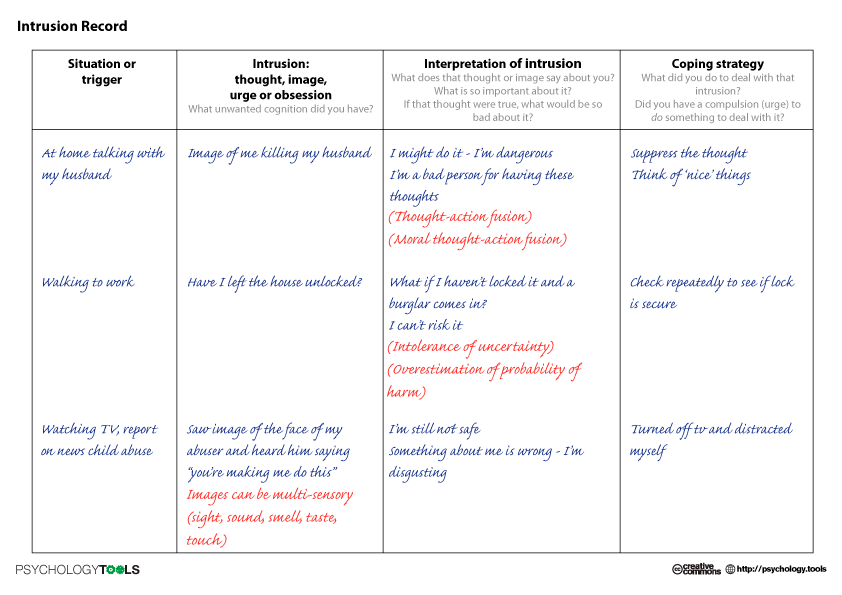
Example
Your coworker was a saint until she ate your sandwich. Now, you cannot stand her. Or, you got a B on your last test, so you have failed at being a good student despite getting only A’s before that.
All-or-nothing thinking usually leads to extremely unrealistic standards for yourself and others that could affect your relationships and motivation.
Black-or-white thoughts may also set you up for failure.
Example
You’ve decided to eat healthy foods. But today, you didn’t have time to prepare a meal, so you eat a bacon burger. This immediately leads you to conclude that you’ve ruined your healthy eating routine, so you decide to no longer even try.
When you engage in polarized thinking, everything is in “either/or” categories. This might make you miss the complexity of most people and situations.
Overgeneralization
When you overgeneralize something, you take an isolated negative event and turn it into a never-ending pattern of loss and defeat.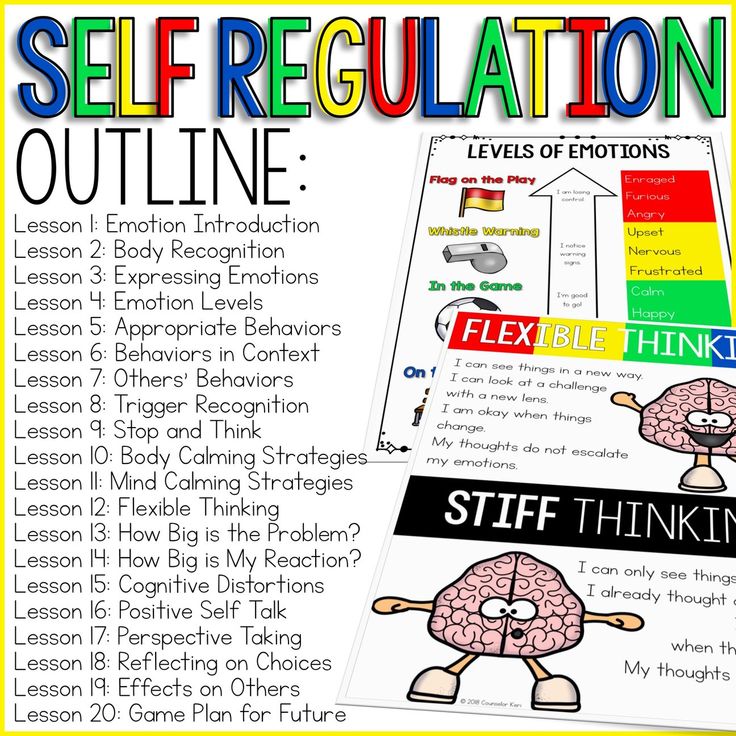
With overgeneralization, words like “always,” “never,” “everything,” and “nothing” are frequent in your train of thought.
Example
You speak up at a team meeting, and your suggestions are not included in the project. You leave the meeting thinking, “I ruined my chances for a promotion. I never say the right thing!”
Overgeneralization can also manifest in your thoughts about the world and its events.
Example
You’re running late for work, and on your way there, you hit a red light. You think, “Nothing ever goes my way!”
Discounting the positive
Discounting positives is similar to mental filtering. The main difference is that you dismiss it as something of no value when you do think of positive aspects.
Example
If someone compliments the way you look today, you think they’re just being nice.
If your boss tells you how comprehensive your report was, you discount it as something anyone else could do.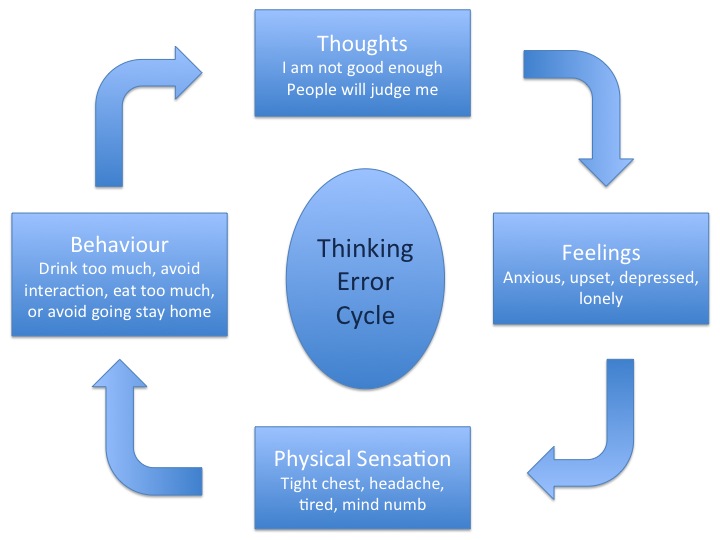
If you do well in that job interview, you think it’s because they didn’t realize you’re not that good.
Jumping to conclusions
When you jump to conclusions, you interpret an event or situation negatively without evidence supporting such a conclusion. Then, you react to your assumption.
Example
Your partner comes home looking serious. Instead of asking how they are, you immediately assume they’re mad at you. Consequently, you keep your distance. In reality, your partner had a bad day at work.
Jumping to conclusions or “mind-reading” is often in response to a persistent thought or concern of yours.
Example
You feel insecure about your relationship. So, when you see your partner looking serious, you assume they might be losing interest in you.
Catastrophizing
Catastrophizing is related to jumping to conclusions. In this case, you jump to the worst possible conclusion in every scenario, no matter how improbable it is.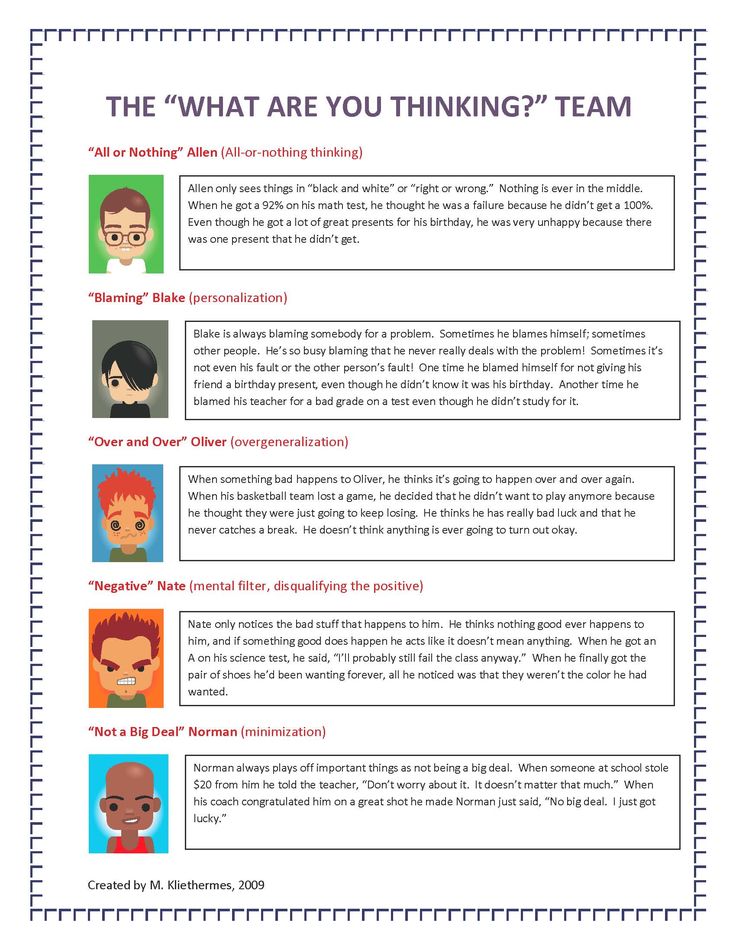
This cognitive distortion often comes with “what if” questions. What if he didn’t call because he got into an accident? What if she hasn’t arrived because she really didn’t want to spend time with me? What if I help this person and they end up betraying or abandoning me?
Several questions might follow in response to one event.
Example
What if my alarm doesn’t go off? What if then I’m late for the important meeting? What if I get fired after I’ve worked so hard for this job?
Personalization
Personalization leads you to believe that you’re responsible for events that, in reality, are completely or partially out of your control.
This cognitive distortion often results in you feeling guilty or assigning blame without contemplating all factors involved.
Example
Your child has an accident, and you blame yourself for allowing them to go to that party.
You feel that if your partner had woken earlier, you would have been ready on time for work.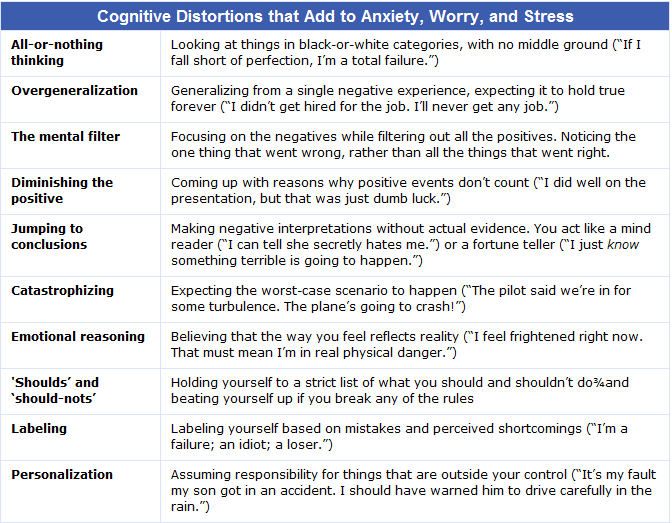
With personalizing, you also take things personally.
Example
Your friend is talking about their personal beliefs regarding parenting, and you take their words as an attack against your parenting style.
Control fallacies
The word fallacy refers to an illusion, misconception, or error.
Control fallacies can go two opposite ways: You either feel responsible or in control of everything in your and other people’s lives, or you feel you have no control at all over anything in your life.
Example
You couldn’t complete a report that was due today. You immediately think, “Of course I couldn’t complete it! My boss is overworking me, and everyone was so loud today at the office. Who can get anything done like that?”
In this example, you place all control of your behavior on someone else or an external circumstance. This is an external control fallacy.
The other type of control fallacy is based on the belief that your actions and presence impact or control the lives of others.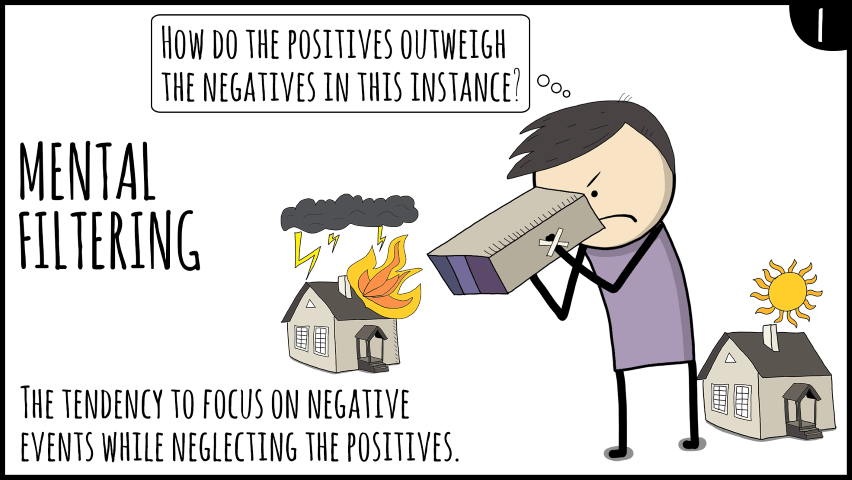
Example
You think you make someone else happy or unhappy. You think all of their emotions are controlled directly or indirectly by your behaviors.
Fallacy of fairness
This cognitive distortion refers to measuring every behavior and situation on a scale of fairness. Finding that other people don’t assign the same value of fairness to the event makes you resentful.
In other words, you believe you know what’s fair and what isn’t, and it upsets you when other people disagree with you.
The fallacy of fairness will lead you to face conflict with certain people and situations because you feel the need for everything to be “fair” according to your own parameters.
But fairness is rarely absolute and can often be self-serving.
Example
You expect your partner to come home and massage your feet. It’s only “fair” since you spent all afternoon making them dinner.
But they arrive exhausted and only want to take a bath.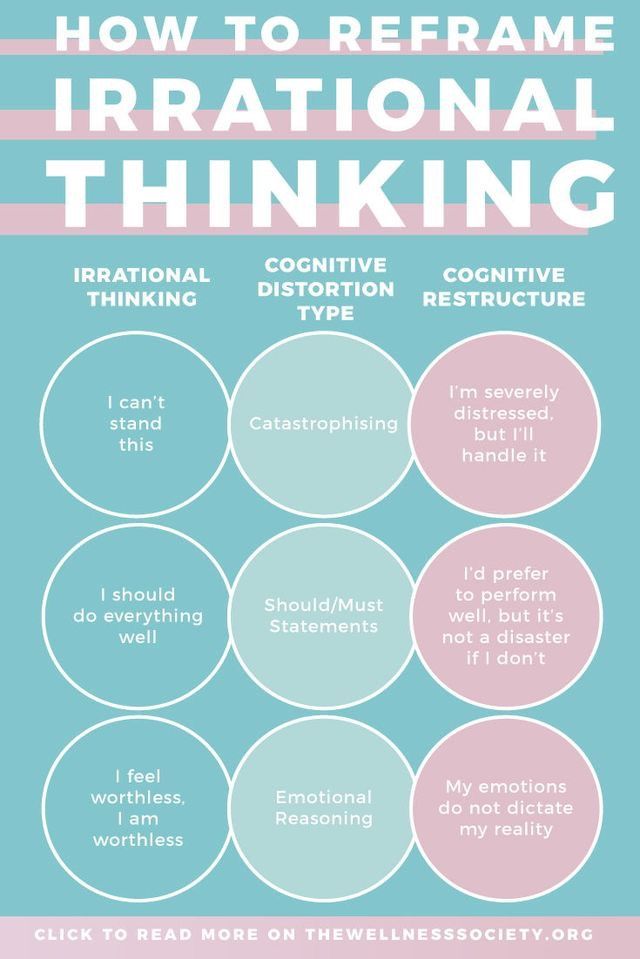 They believe it’s “fair” to take a moment to relax from the day’s chaos, so they can pay full attention to you and enjoy your dinner instead of being distracted and tired.
They believe it’s “fair” to take a moment to relax from the day’s chaos, so they can pay full attention to you and enjoy your dinner instead of being distracted and tired.
Blaming
Blaming refers to making others responsible for how you feel.
“You made me feel bad” is what usually defines this cognitive distortion. However, even when others engage in hurtful behaviors, you’re still in control of how you feel in most situations.
The distortion comes from believing that others have the power to affect your life, even more so than yourself.
Example
Your partner comments on your new dress and you feel upset for the rest of the day. “You make me feel bad about myself,” you tell them.
Shoulds
As cognitive distortions, “should” statements are subjective ironclad rules you set for yourself and others without considering the specifics of a circumstance.
You tell yourself that things should be a certain way with no exceptions.
Example
You think people should always be on time, or that someone who is independent should also be self-sufficient and never ask for help.
When it comes to yourself, you might believe you should always make your bed, or you should always make people laugh.
“You should be better,” you constantly tell yourself.
When these things don’t happen — they really depend on many factors — you feel guilty, disappointed, let down, or frustrated.
You may believe you’re trying to motivate yourself with these statements, such as “I should go to the gym every day.”
However, when circumstances change, and you can’t do what you should, you become angry and upset. You got out of work late and couldn’t get to the gym, for example.
Emotional reasoning
Emotional reasoning leads you to believe that the way you feel is a reflection of reality. “I feel this way about this situation, hence it must be a fact,” defines this cognitive distortion.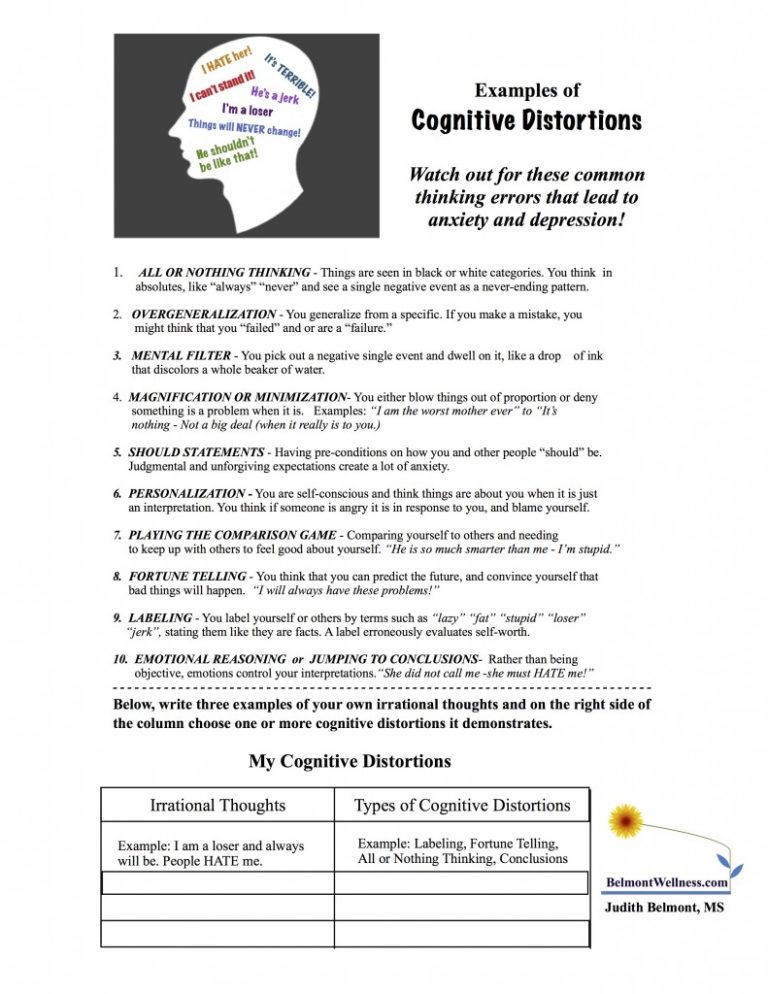
Example
Feeling inadequate in a situation turns into, “I don’t belong anywhere.”
This cognitive distortion might also lead you to believe future events depend on how you feel.
Example
You may firmly believe something bad will happen today because you woke up feeling anxious.
You might also assess a random situation based on your emotional reaction. If someone says something that makes you angry, you immediately conclude that person is treating you poorly.
Fallacy of change
The fallacy of change has you expecting other people will change their ways to suit your expectations or needs, particularly when you pressure them enough.
Example
You want your partner to focus only on you, despite knowing that they’ve always been very social and value time with friends.
So, every time they go out, you let them know it’s not OK with you. Eventually, you know they will change their ways and want to stay home all the time.
Global labeling
Labeling or mislabeling refers to taking a single attribute and turning it into an absolute.
This happens when you judge and then define yourself or others based on an isolated event.
The labels assigned are usually negative and extreme.
Example
You see your new teammate applying makeup before a meeting, and you call them “shallow.” Or, they don’t submit a report on time, and you label them “useless.”
This is an extreme form of overgeneralization that leads you to judge an action without taking the context into account. This, in turn, leads you to see yourself and others in ways that might not be accurate.
Assigning labels to others can impact how you interact with them. This, in turn, could add friction to your relationships.
When you assign those labels to yourself, it can hurt your self-esteem and confidence, leading you to feel insecure and anxious.
Always being right
This desire turns into a cognitive distortion when it trumps everything else, including evidence and other people’s feelings.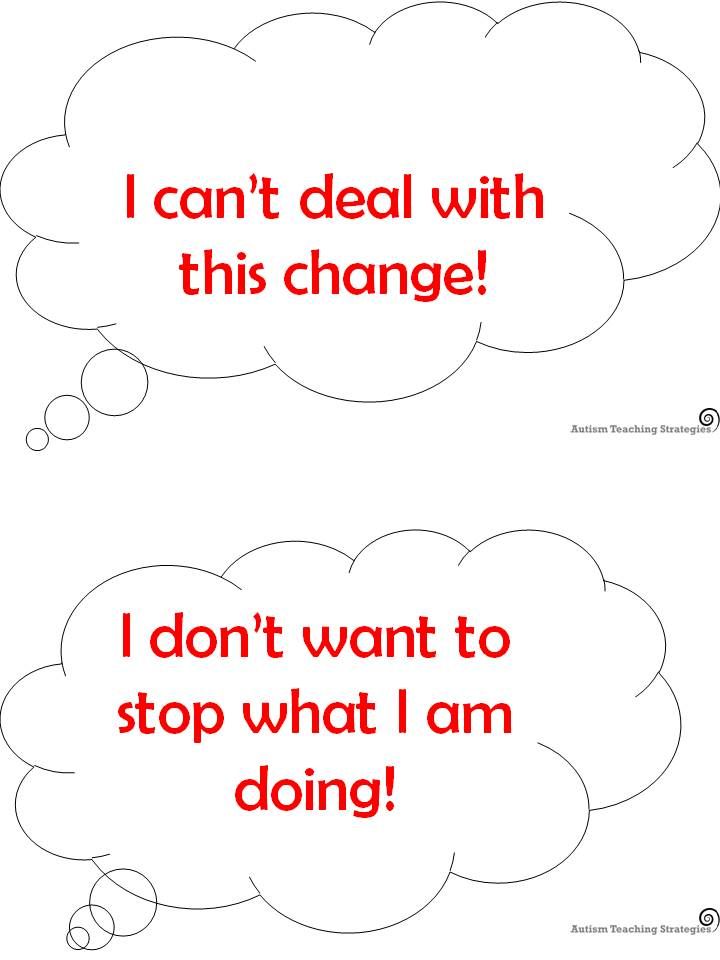
In this cognitive distortion, you see your own opinions as facts of life. This is why you will go to great lengths to prove you’re right.
Example
You quarrel with your sibling about how your parents haven’t supported you enough. You’re convinced this was the case all the time, while your sibling believes it varied according to the situation.
Since your sibling doesn’t feel the same way, you become angry and say things that rub your sibling the wrong way.
You know they’re getting upset, but you continue the argument to prove your point.
Most irrational patterns of thought can be reversed once you’re aware of them. This applies to negative thinking, too.
Still, cognitive distortions sometimes go hand in hand with mental health conditions, such as personality disorders. This makes it more challenging to reframe.
Reaching out to a mental health professional can help if you feel the process is too overwhelming.
Meanwhile, try to remember that it’s not the events but your thoughts that upset you in many instances.
You might not be able to change the events, but you can work on redirecting your distorted thoughts.
Beginning with small changes can be helpful. Here are some tips:
1. Thinking about your thoughts
If an event is upsetting you, step away from it if you can and try to focus on what you’re telling yourself about the event.
2. Replacing absolutes
Once you focus on your thoughts and recognize a pattern, consider replacing statements such as “always” and “nothing” with “sometimes” and “this.”
3. Defining yourself and others
Try labeling the behavior. Instead of labeling yourself “lazy” because you didn’t clean today, consider: “I just didn’t clean today.” One action doesn’t have to define you.
4. Searching for positive aspects
Even if it’s challenging at first, what if you find at least three positive examples in each situation. It might not feel natural, but eventually, it may become a spontaneous habit.
5. Does evidence back up your negative thought?
Before concluding, consider asking, investigating, and questioning yourself and others to ensure you have as many facts as possible. If you can, make an extra effort to believe these facts.
If you can, make an extra effort to believe these facts.
Cognitive distortions are negative filters that impact how you see yourself and others.
When our thoughts are distorted, our emotions are, too. By becoming aware and redirecting these negative thoughts, you can significantly improve your mood and quality of life.
20 Cognitive Distortions: How They Affect Our Lives
126,668
Knowing YourselfA Man among PeoplePractices how to
- Photo
- Unsplash
Worldview is not determined by circumstances. We ourselves choose our attitude to everything that happens around us. What is the difference between someone who remains optimistic despite many adversities and someone who is angry at the whole world for pinching his finger? It's all about different patterns of thinking.
In psychology, the term "cognitive distortion" is used, which means an illogical, preconceived conclusion or belief that distorts the perception of reality, usually in a negative way. The phenomenon is quite common, but if you do not know what it is expressed in, it is not easy to recognize it. In most cases, this is the result of automatic thoughts. They are so natural that a person does not even realize that he can change them. It is not surprising that many take a fleeting assessment for an indisputable truth.
The phenomenon is quite common, but if you do not know what it is expressed in, it is not easy to recognize it. In most cases, this is the result of automatic thoughts. They are so natural that a person does not even realize that he can change them. It is not surprising that many take a fleeting assessment for an indisputable truth.
Cognitive distortions cause serious harm to mental health and often lead to stress, depression and anxiety
If not taken care of in time, automatic thoughts become fixed as patterns and can negatively affect behavior and decision-making logic. Anyone who wants to maintain a healthy psyche will do well to understand how cognitive distortions work and how they affect our worldview.
Common cognitive distortions
1. Black and white thinking
A person with dichotomous thinking perceives the world from the position of “either/or”, there is no third way. Good or bad, right or wrong, all or nothing. He does not admit that between black and white one can almost always find at least a few shades of gray. Anyone who sees people and events from only two sides refuses to accept intermediate (and most often the most objective) assessments.
Good or bad, right or wrong, all or nothing. He does not admit that between black and white one can almost always find at least a few shades of gray. Anyone who sees people and events from only two sides refuses to accept intermediate (and most often the most objective) assessments.
2. Personalization
People with this type of thinking tend to overestimate their importance and take many things personally. Other people's behavior is usually seen as a consequence of their own actions or deeds. As a result, those who are prone to personalization take responsibility for external circumstances, although nothing really depended on them.
3. Hypertrophied sense of duty
Attitudes like “must”, “must”, “should” are almost always associated with cognitive distortions. For example: "I had to come to the meeting early", "I have to lose weight to become more attractive." Such thoughts cause feelings of shame or guilt.
We treat others no less categorically and say something like: “he should have called yesterday”, “she is forever indebted to me for this help”. People with such beliefs are often upset, offended and angry at those who did not justify their hopes. But with all our desire, we are not able to influence someone else's behavior, and it is definitely not worth thinking that someone “should” do something.
People with such beliefs are often upset, offended and angry at those who did not justify their hopes. But with all our desire, we are not able to influence someone else's behavior, and it is definitely not worth thinking that someone “should” do something.
4. Catastrophization
The habit of perceiving any minor annoyance as an inevitable disaster. Let's say a person fails one exam and immediately imagines that he won't finish the course at all. Or the exam is still ahead, and he "knows" in advance that he will certainly fail, because he always expects the worst - so to speak, "advance" catastrophization.
5. Exaggeration
With such a cognitive distortion, everything that happens is inflated to a colossal scale. The case resembles a catastrophe, but not so severe. It is best described by the saying "make an elephant out of a fly."
6. Understatement
Those who tend to exaggerate easily underestimate the significance of pleasant events. Two opposite distortions often end up in the same bundle. People think something like this: “Yes, I was promoted, but just a little - it means that they don’t appreciate me at work.”
Two opposite distortions often end up in the same bundle. People think something like this: “Yes, I was promoted, but just a little - it means that they don’t appreciate me at work.”
7. Telepathy
People with this mindset ascribe extrasensory abilities to themselves and believe they can read others like an open book. They are confident that they know what the interlocutor is thinking, although guesses are rarely true.
8. Clairvoyance
The so-called "clairvoyants" try to predict the future, usually in a black light. For example, without any reason they say that everything will end badly. Before a concert or a movie show, they usually say: “We don’t have to go anywhere, I have a presentiment that the tickets will run out in front of our noses.”
9. Generalization
The tendency to generalize means the habit of drawing conclusions from one or two cases and denying that life is too complicated for hasty conclusions. If a friend does not come to a meeting, this does not mean that he is not able to fulfill the promise at all.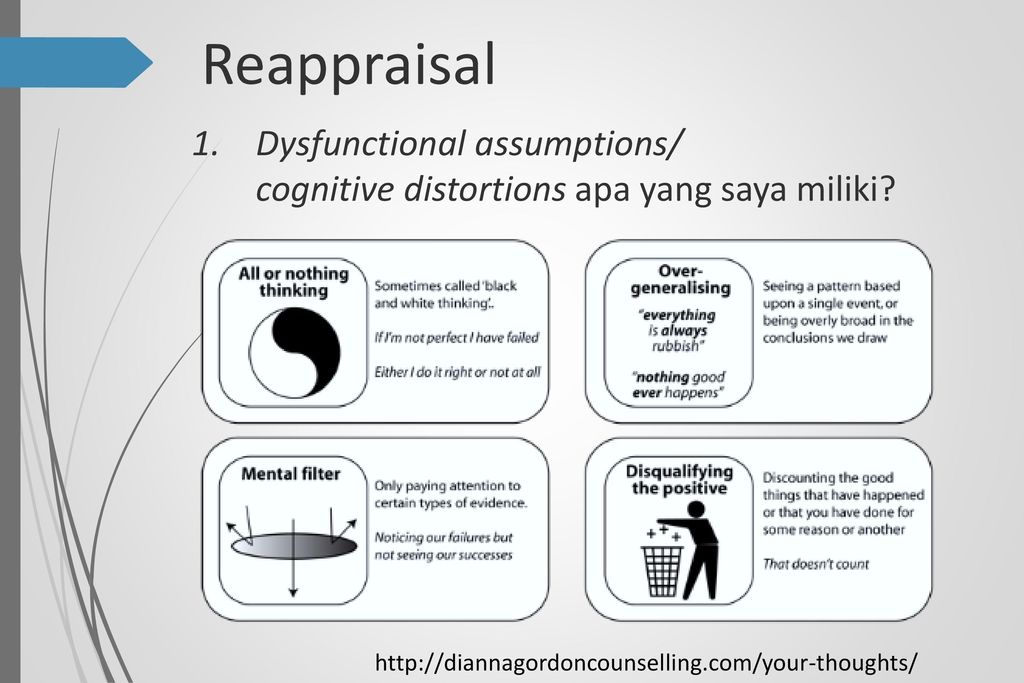 In the vocabulary of a person prone to make such a cognitive error, the words “always”, “never”, “always”, “every time” are often found.
In the vocabulary of a person prone to make such a cognitive error, the words “always”, “never”, “always”, “every time” are often found.
10. Devaluation
An extreme form of “all or nothing” thinking, which manifests itself in a tendency to devalue any achievements, events, experiences (including one's own) and to see everything as negative. A person with such stereotypes usually neglects compliments and praise.
11. Selective perception
Cognitive distortion, similar to the previous one, is expressed in the habit of filtering any information and choosing the “appropriate” statement. For example, a person reads his/her school testimonial or employer's recommendation, excludes all the good ones and fixates on a single critical remark.
- Photo
- Unsplash
12. Labeling
A more rigid kind of generalization means that a person evaluates himself and others on the basis of a single case.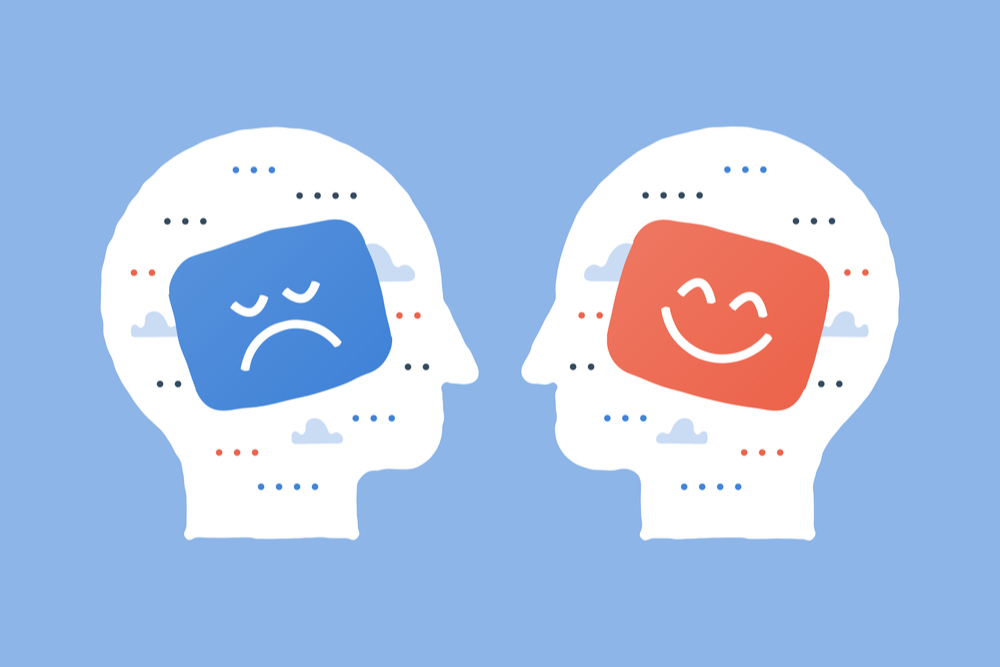 It is easier for him to automatically label himself as a loser than to recognize someone's right to make a mistake.
It is easier for him to automatically label himself as a loser than to recognize someone's right to make a mistake.
13. The habit of blaming
The other side of personalization. Instead of blaming yourself for mistakes, it is more convenient to shift the blame to others or an unforeseen situation.
14. Emotional conditioning
This is the name of the erroneous sensory perception of reality. If I'm scared, then there's a real threat. If I think I'm stupid, then I am. Such thinking can indicate serious mental disorders - including pointing to obsessive-compulsive disorder. For example, a person feels dirty even though they have showered twice in the last hour.
15. The illusion of one's own rightness
A cognitive error turns a private point of view into an indisputable fact and allows one to disregard the opinions and feelings of others. This makes it very difficult to create and maintain healthy relationships.
16. Self-seeking attribution
The tendency to ascribe exclusively positive qualities to oneself and deny one's involvement in any unpleasant or undesirable events.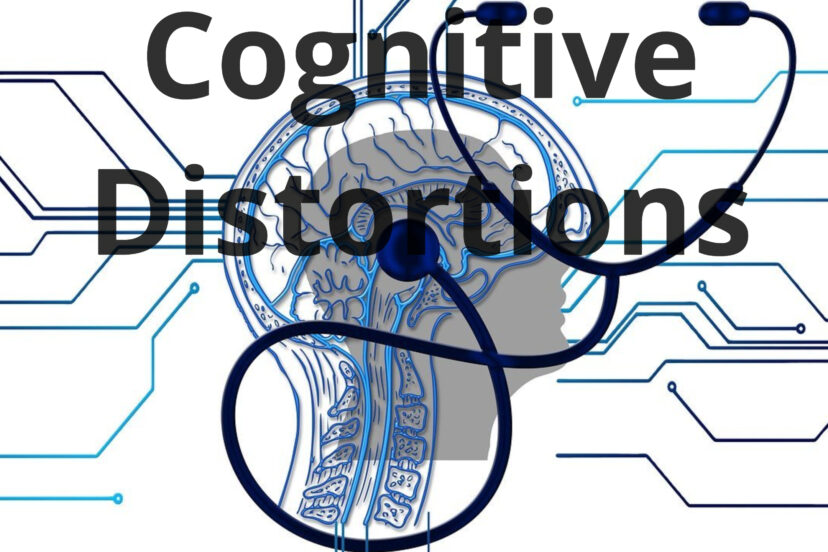 A person with such a mindset refuses to admit his shortcomings and is absolutely confident in his own infallibility.
A person with such a mindset refuses to admit his shortcomings and is absolutely confident in his own infallibility.
17. Waiting for a “divine reward”
It is a delusion that higher powers will sooner or later appreciate our sacrifices. Under its influence, people neglect their interests and needs in the hope that someday they will be rewarded for their dedication. And since this never happens, they are overcome by anger and resentment.
18. The illusion of change
The belief that others must change in order to be happy. This is the mindset of an egomaniac who insists that others fit into his schedule, or demands that a partner not wear their favorite T-shirt because they don't like it.
19. Belief in justice
The phenomenon is expressed in the idea of a just world in which everyone gets what they deserve, although in reality this rarely happens. An example of such a thinking trap is to think that a person deserved everything that happened to him.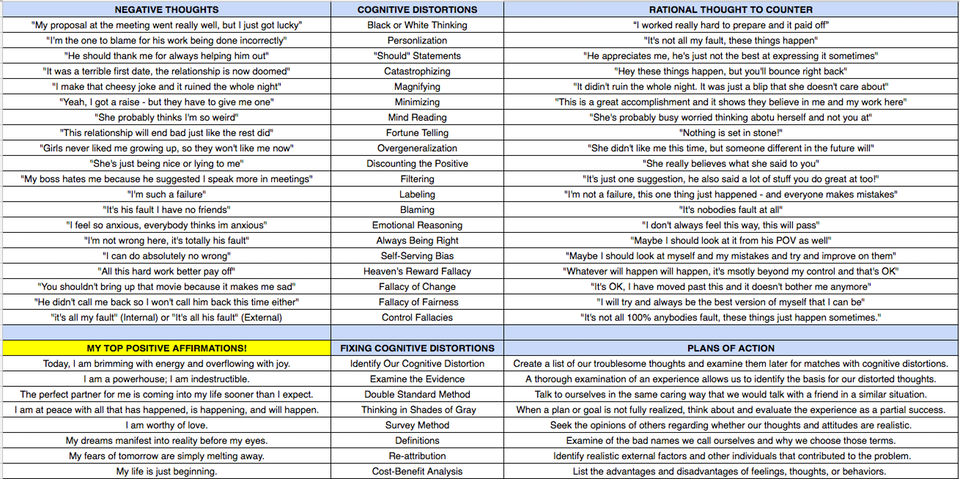
20. Illusion of control
Someone who thinks that everything in the world can be controlled is pissed off by someone else's behavior - for the simple reason that he cannot be influenced in any way. A person obsessed with the desire to control everything may blame the boss for the poor performance of the company, although the real problem may lie elsewhere.
HOW TO CORRECT THOUGHT PATTERNS?
Most likely, you have discovered at least one of the listed cognitive distortions. Perhaps you or someone you know has fallen into similar traps more than once. The good news is that we are not bound to them forever.
Patterned thinking can be changed: this process is called cognitive restructuring
Its essence is that we can influence our own emotions and actions by correcting our automatic thoughts. Many popular forms of therapy are based on this concept, including cognitive behavioral therapy and rational emotive behavior therapy.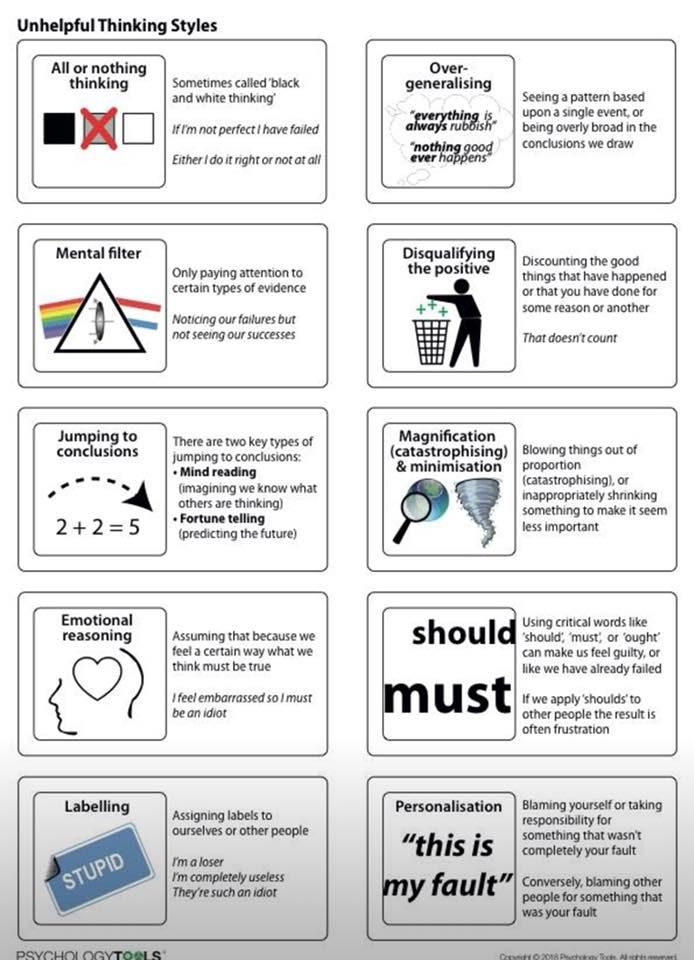
If you have one or more cognitive distortions and feel that they cause anxiety, depression or other psychological problems, be sure to see a psychotherapist. An experienced specialist will help transform negative attitudes into more constructive and inspiring beliefs.
Arthur Freeman, Rose DeWulf "Mistakes of thinking, or how to live without regrets"
Look, make no mistake! Look, don't be sorry! Everyone has heard such phrases addressed to them many times in their lives. Is life possible without mistakes and regrets? Arthur Freeman and Rose DeWulf, recognized experts in the field of mental health, say: "Yes, it is possible!" How to learn how to make decisions right the first time, you will learn from this wonderful book, which has long become a bestseller in more than twenty countries around the world.
Advertising. www.chitai-gorod.ru
Text: Elena Anisimova Photo credit: Unsplash
New on the site
From a London political scientist to a Russian chef: a candid story about finding yourself
Robert Plutchik's wheel of emotions: how to understand yourself - use a simple tool
What a highly sensitive person needs: 10 conditions - improve your life
"My parents think that without a man I am nothing"
"My husband went to his homeland and got married there"
Psychologists figured out why women really like to post selfies so much
Indifference, isolation, lethargy: what is emotional insensitivity - 8 signs
Top 15 cognitive biases | PSYCHOLOGIES
132,181
Knowing Yourself A Human Among Humans
Typically, our mind uses cognitive distortions to reinforce some negative emotion or negative line of reasoning.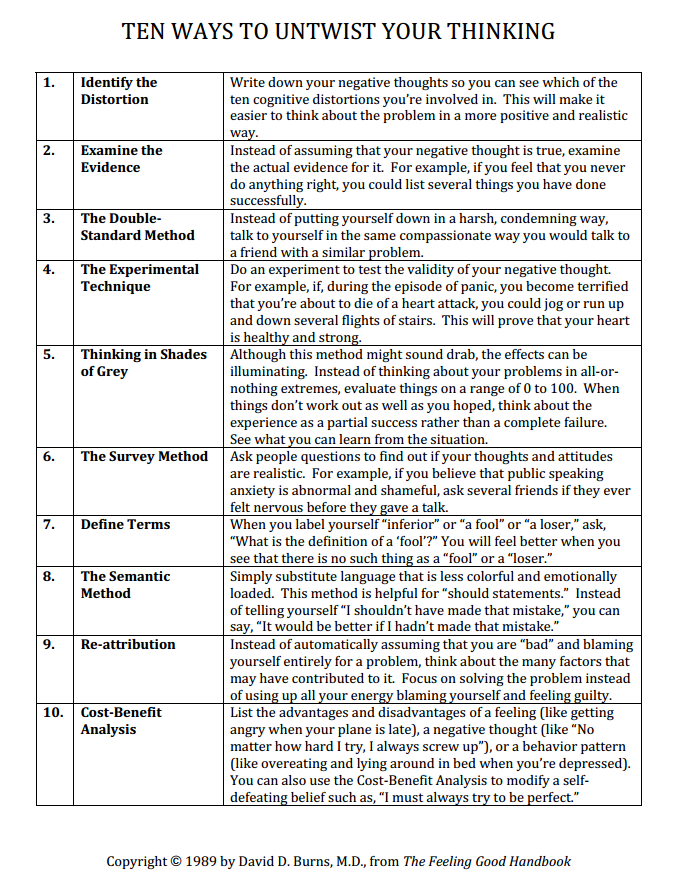 The voice in our head sounds rational and authentic, but in reality only reinforces our poor opinion of ourselves.
The voice in our head sounds rational and authentic, but in reality only reinforces our poor opinion of ourselves.
For example, we say to ourselves, “I always fail when I try to do something new.” This is an example of "black and white" thinking - with this cognitive distortion, we perceive the situation only in absolute categories: if we fail in one thing, then we are doomed to endure it in the future, in everything and always.
If we add “I must be a complete loser” to these thoughts, this is an example of overgeneralization - such a cognitive distortion generalizes ordinary failure to the scale of our entire personality, we make it our essence.
Here are the main examples of cognitive distortions to keep in mind and practice, keeping track of them and responding to each one in a more calm and measured way.
1. Filtering
We focus on the negative while filtering out all the positive aspects of the situation. Obsessed with an unpleasant detail, we lose objectivity, and reality is blurred and distorted.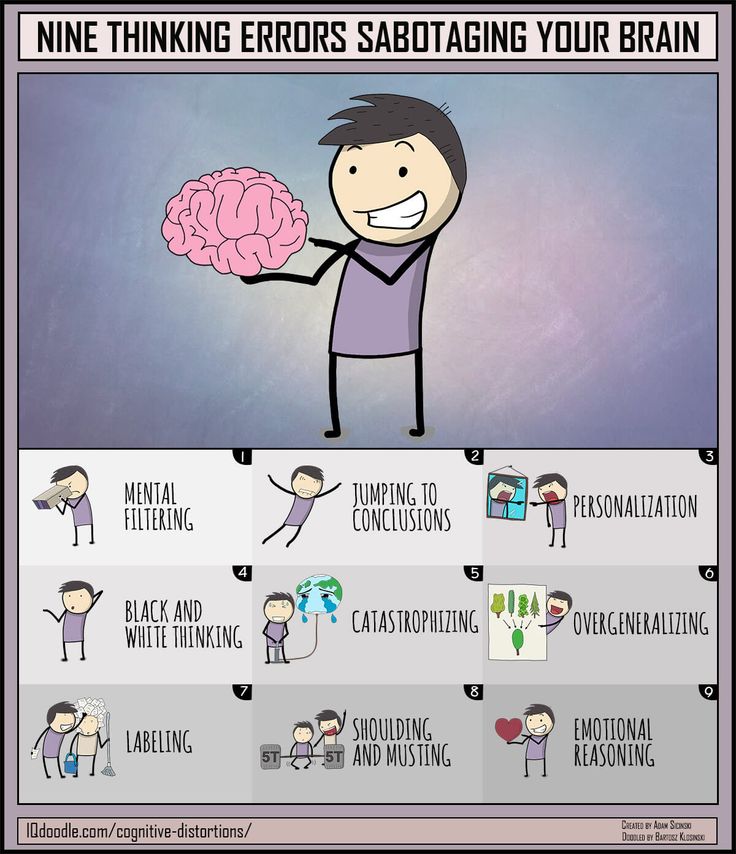
2. Black and white thinking
With black and white thinking, we see everything either in black or in white, there can be no other shades. We must do everything perfectly or we will fail - there is no middle ground. We rush from one extreme to another, not allowing the idea that most situations and characters are complex, composite, with many shades.
3. Overgeneralization
With this cognitive bias, we come to a conclusion based on a single aspect, a "piece" of what happened. If something bad happens once, we convince ourselves that it will happen again and again. We begin to see a single unpleasant event as part of an endless chain of defeats.
4. Jumping to conclusions
The other person hasn't said a word yet, and we already know exactly what he feels and why he behaves the way he does. In particular, we are confident that we can determine how people feel about us.
For example, we may infer that someone doesn't like us, but we won't lift a finger to find out if it's true.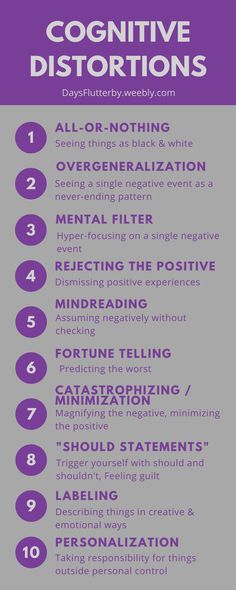 Another example: we convince ourselves that things will go wrong, as if it were a fait accompli.
Another example: we convince ourselves that things will go wrong, as if it were a fait accompli.
5. Injection
We live in anticipation of a catastrophe that is about to break out, not paying attention to objective reality. The same can be said about the habit of minimizing and exaggerating. When we hear about a problem, we immediately turn on “what if? ..”: “If this happens to me? What if tragedy happens?
We exaggerate the importance of minor events (say, our own mistake or someone else's achievement) or, on the contrary, mentally reduce an important event until it seems tiny (for example, our own desirable qualities or the shortcomings of others).
6. Personification
With this cognitive distortion, we believe that the actions and words of others are a personal reaction to us, our words and actions. We also constantly compare ourselves to others, trying to figure out who is smarter, better looking, and so on.
In addition, we may consider ourselves the cause of some unpleasant event, for which we objectively do not bear any responsibility.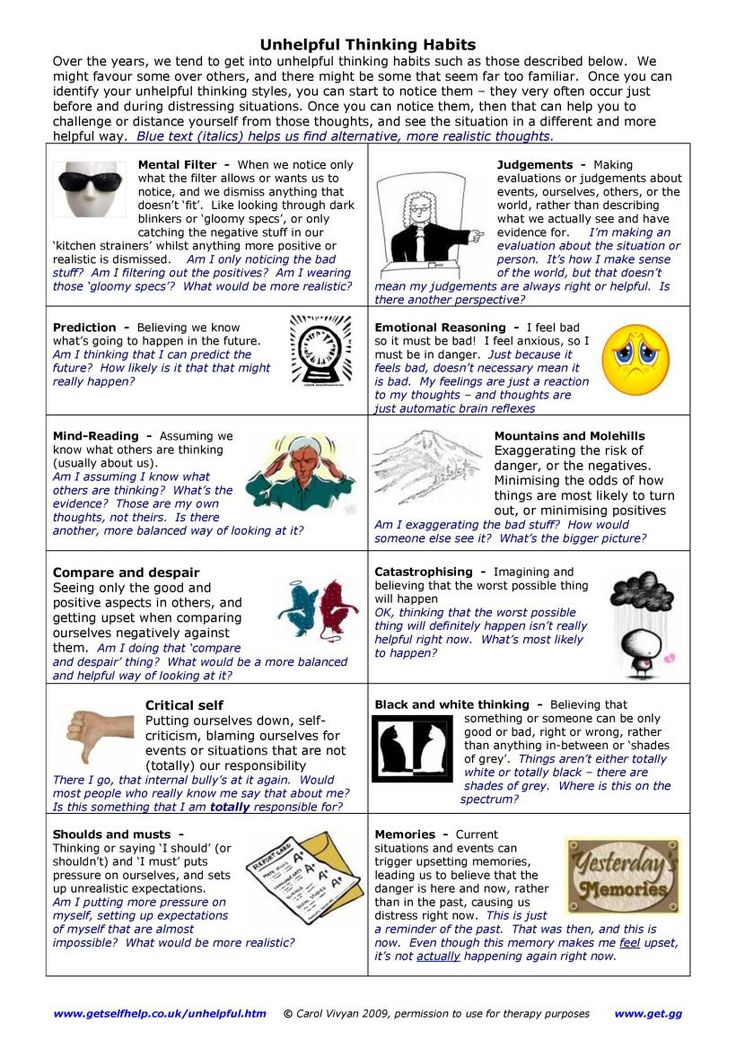 For example, a skewed chain of reasoning might be: “We were late for dinner, so the hostess dried the meat. If only I had hurried my husband, this would not have happened.
For example, a skewed chain of reasoning might be: “We were late for dinner, so the hostess dried the meat. If only I had hurried my husband, this would not have happened.
7. False conclusion about control
If we feel that we are controlled from the outside, then we feel like a helpless victim of fate. The fallacy of control makes us responsible for the pain and happiness of everyone around us. "Why are not you happy? Is it because I did something wrong?
8. False conclusion about justice
We feel offended that we have been treated unfairly, but others may have a different point of view on this matter. Remember, as children, when things didn't go the way we wanted them to, adults would say, "Life isn't always fair."
Those of us who judge every situation "fairly" often end up feeling bad. Because life is sometimes "unfair" - not everything and not always develops in our favor, no matter how much we would like it.
9. Blaming
We believe that other people are responsible for our pain, or vice versa, we blame ourselves for every problem.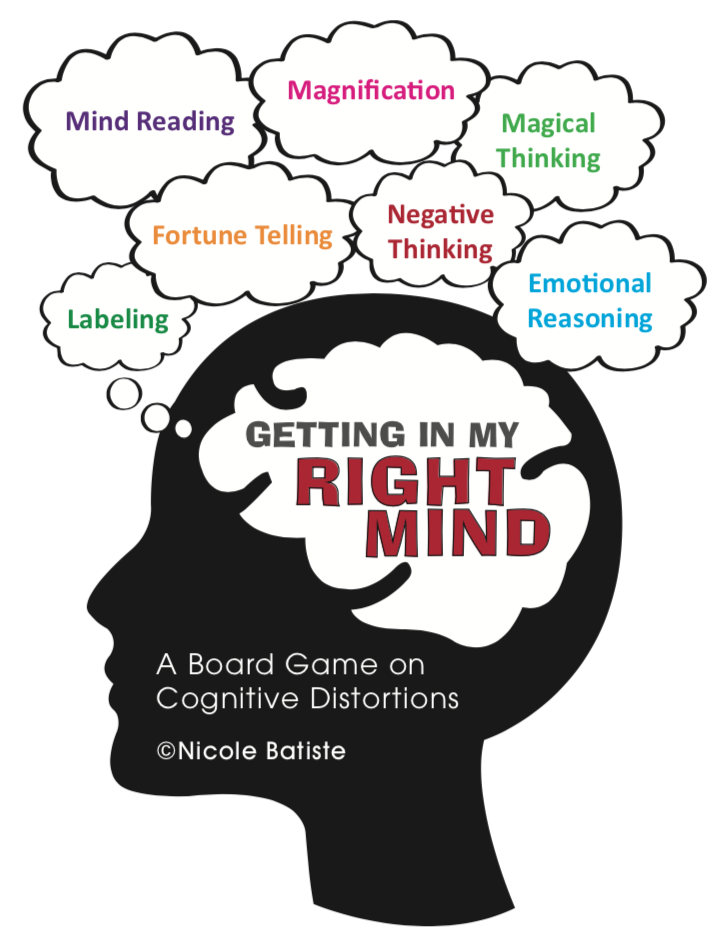 An example of such a cognitive distortion is expressed in the phrase: “You keep making me feel bad about myself, stop it!” No one can "make you think" or make you feel - we ourselves control our emotions and emotional reactions.
An example of such a cognitive distortion is expressed in the phrase: “You keep making me feel bad about myself, stop it!” No one can "make you think" or make you feel - we ourselves control our emotions and emotional reactions.
10. "I (shouldn't)"
We have a list of ironclad rules about how we and the people around us should behave. Anyone who breaks one of the rules causes our anger, and we get angry at ourselves when we break them ourselves. We often try to motivate ourselves with what we should or should not, as if we are doomed to receive punishment before we do anything.
For example: “I have to play sports. I shouldn't be so lazy." “Must”, “must”, “should” are from the same series. The emotional consequence of this cognitive distortion is guilt. And when we take a "should" approach to other people, we often feel anger, impotent rage, frustration, and resentment.
11. Emotional Arguments
We believe that what we feel must automatically be true.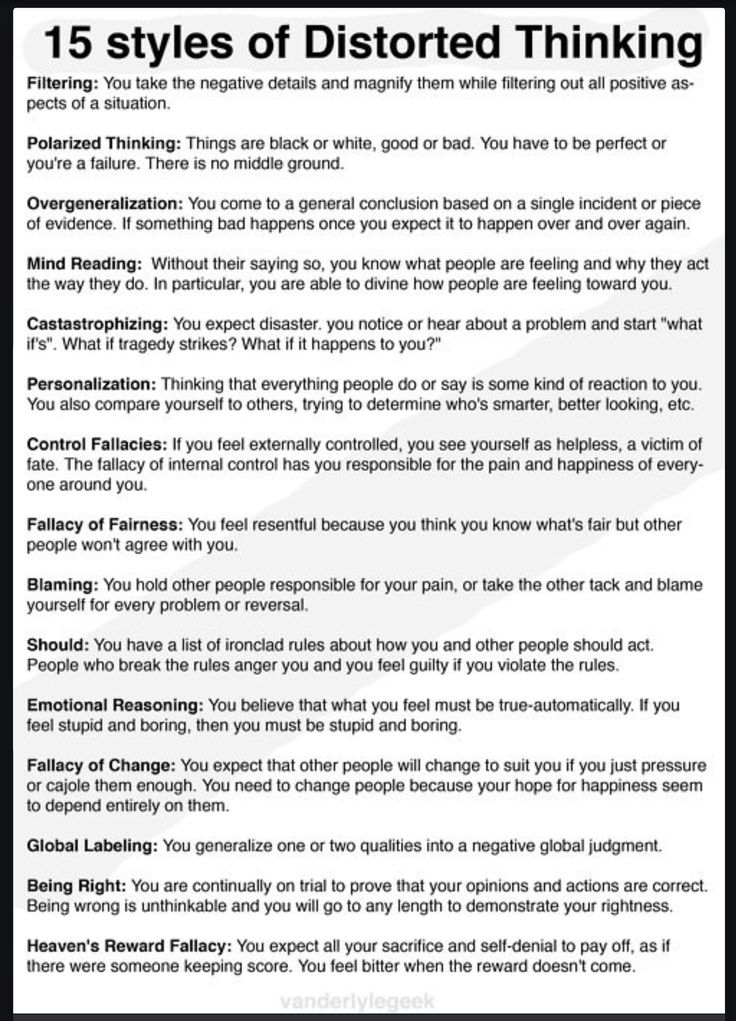 If we feel stupid or boring, then we really are. We take for granted how our unhealthy emotions reflect reality. "That's how I feel, so it must be true."
If we feel stupid or boring, then we really are. We take for granted how our unhealthy emotions reflect reality. "That's how I feel, so it must be true."
12. False conclusion about change
We tend to expect others to change to suit our desires and demands. You just need to press or cajole properly. The drive to change others is so persistent because we feel like our hopes and happiness depend entirely on those around us.
13. Labeling
We generalize one or two qualities to a global judgment, we take the generalization to the extreme. This cognitive bias is also called labeling. Instead of analyzing the error in the context of a particular situation, we attach an unhealthy label to ourselves. For example, we say “I am a loser” after failing in some business.
When faced with the unpleasant consequences of someone's behavior, we can label the person who behaved in this way garden. Such a label is usually charged with negative emotions.
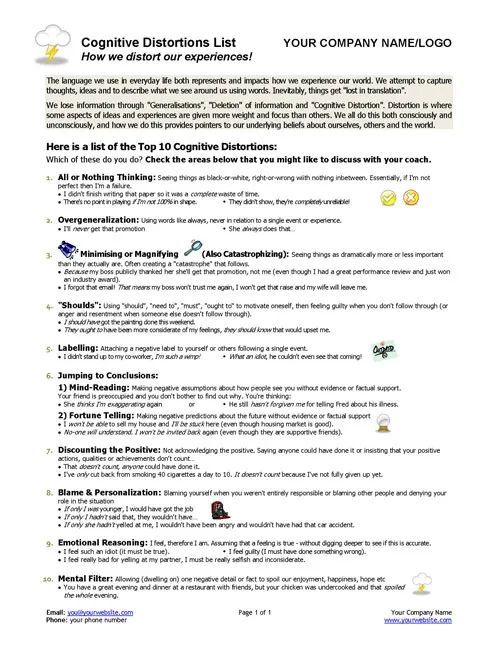
Learn more


